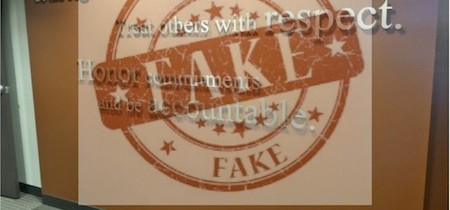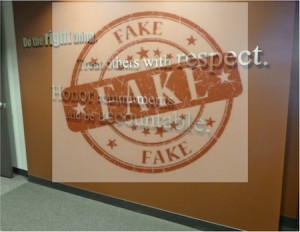10 Indicators That Business Values Might Be Fake
Many companies have stated values. Maybe your company does too.
The top five most common values are:
- Integrity (or Ethics)
- Respect (or Trust)
- Excellence (or Quality)
- Responsibility (or Accountability)
- Teamwork (or Collaboration)
Companies often display their values on a wall or highly visible place in the office.
If decisions and/or behaviors occur that do not support these values, employees will consider the stated values as fake.
Fake = not genuine; a forgery or sham
This impacts more than employees. Customers, suppliers, and even investors might consider business promises as untrustworthy. This in turn reduces brand equity.
Who wants to be associated with a fake?
So how can you tell if the values of a business might be fake?
10 Indicators That Business Values Might Be Fake
- Questionable decisions are justified, “If we don’t do this, we’ll go out of business.” Any time decisions or behaviors are justified for “the sake of the business”, a big yellow caution flag should be waved in the air.
- Senior leaders or select individuals appear to be exempt from stated policies. When certain individuals, regardless of the stated reasons, don’t have to follow the same rules as everyone else, you might be smelling fake.
- Managers brush off questionable behavior stating, “It’s no big deal.” A “brush off” may indicate values are being purposefully ignored, making them fake.
- Employees feel scared or intimidated to question management decisions. It’s everyone’s job to hold others accountable to stated values. If someone is scared to raise their hand, fake is likely in the air.
- Others groan or roll their eyes when someone references the company values. Values should be treated as a serious evaluation tool. When others belittle their reference, fake has already set in.
- Customers are suing the company for unresolved issues or complaints. While lawsuits can happen to any company, if this becomes a normal course of business it’s a good sign that the values are fake.
- Suppliers are suing the company for not being paid. If this is viewed as normal business practices, it’s a good sign the company’s values are fake.
- Investors are suing the company for poor decision-making. When investors get frustrated with management, and their reasons appear legitimate, they tend to use the court system to show their displeasure. This is a good indicator the company’s values are fake.
- Employees are suing the company for how they are being treated. Like investors, if employees don’t feel they have been heard, or are not seeing changes to management decisions or behaviors, they also run to the court system. Such actions almost always suggest the stated values are fake.
- Senior leaders are being called before a congressional committee. When a situation gets messy enough or brought into the public eye to garner government attention, the company’s values are most certainly viewed as fake.
So what are some counter-measures to prevent fake values?
Continually reinforce the importance of the company’s stated values.
- Discuss them in team meetings.
- Include them in employee reviews.
- Acknowledge decisions that are aligned with the company’s values.
- Reward behavior that supports the values.
- Reprimand anyone (including leaders) that behave or make decisions in violation of stated values (yes, this includes firing them).
If you don’t want your business to be viewed as a fake, encourage everyone associated with the company to treat the stated values with respect.
If the values are treated as real, the company will be treated the same.
What are other signs that a company might have fake values?









